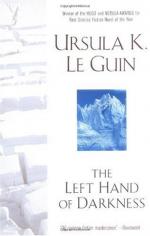|
This section contains 1,211 words (approx. 5 pages at 300 words per page) |

|
[Ursula K. Le Guin] has been compared to C. S. Lewis, with some appropriateness, especially as concerns her juvenile trilogy, but that comparison fails ultimately because she is a better writer than Lewis: her fictions, both juvenile and adult, are richer, deeper, and more beautiful than his. She is probably the best writer of speculative fabulation working in this country today, and she deserves a place among our major contemporary writers of fiction. For some writers, the SF ghetto serves a useful protective function, preserving them from comparison with their best contemporaries. For Ursula Le Guin, as for others, this protection, and the sense of a responsive, relatively uncritical audience that goes with it, may have been helpful during her early development as a writer. But with The Left Hand of Darkness (1969) she displayed powers so remarkable that only full and serious critical scrutiny can begin to reveal...
|
This section contains 1,211 words (approx. 5 pages at 300 words per page) |

|


